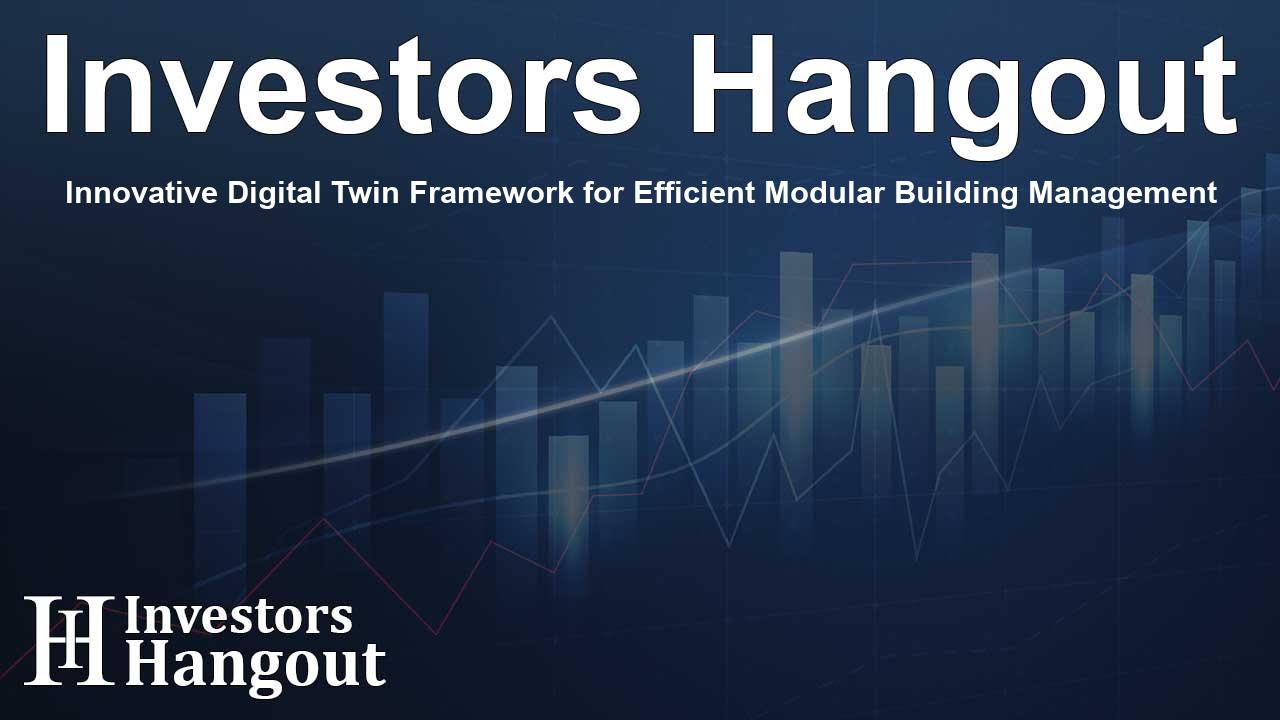Innovative Digital Twin Framework for Efficient Modular Building Management

Researchers Create Digital Twin Framework for Modular Buildings
In a remarkable advancement in facility management, a team of researchers has developed a cutting-edge digital twin framework that aims to transform the efficiency and sustainability of relocatable modular buildings (RMBs). This innovative management system utilizes technology to simplify logistics and improve lifecycle management of modular structures.
Understanding Relocatable Modular Buildings
Relocatable modular buildings represent a versatile solution in modern construction, utilizing prefabricated modules which can be quickly assembled and transported. By minimizing costs and reducing environmental footprint, these buildings provide safer and more efficient construction environments. However, effectively managing these assets during their relocation and reuse remains a significant challenge, often limiting the broader adoption of RMBs.
Digital Twin Technology in Modular Construction
The research team, under the direction of Associate Professor Yonghan Ahn from the School of Architecture & Architectural Engineering at Hanyang University ERICA, has embarked on a new study focused on enhancing the management capabilities of RMBs through digital twin technology. "Digital twin technology serves as a revolutionary tool, providing a detailed digital replica of physical assets, integrating real-time data with analytics to bolster decision-making capabilities," explains Prof. Ahn. Despite the growing use of digital twins in various sectors, their application within modular construction has been somewhat limited. Therefore, the team has introduced a tailored digital twin-enabled facility management system (DT-FMS) specifically for RMBs.
Integration of Advanced Technologies
This comprehensive DT-FMS encompasses several advanced technologies, including building information modeling (BIM), the Internet of Things (IoT), and geographic information systems (GIS). This integration allows for the creation of a dynamic virtual model of RMBs, supporting real-time monitoring and logistical analysis throughout the lifecycle of the building. With BIM offering robust three-dimensional models and precise building information, IoT provides vital real-time data, while GIS aids crucial geographic insights, ensuring effective management decisions.
Framework Structure and Functionality
The digital twin framework comprises three interconnected layers: the physical, digital, and service layers. The physical layer enables real-time tracking of resources, modular units, and stakeholders, including engineers and workers. It establishes communication among various physical components. In contrast, the digital layer houses modeling tools, data integration systems, and analytical functionalities. Finally, the service layer empowers users to interact with the framework effectively, promoting optimal decision-making throughout the building's lifespan.
Real-World Application and Benefits
To validate the practical implementation of the DT-FMS, the research team conducted a case study focused on a relocatable modular school system. This case study significantly enhanced decision-making regarding module distribution and reuse, illustrating the framework's potential to improve management efficiency and promote sustainability in modular construction.
Dr. Dennis Nguyen from Hanyang University emphasized the critical role of digital twins in fostering a circular economy by facilitating the reuse and optimal relocation of modular units. This approach minimizes waste and maximizes value throughout continuous project cycles, making digital twins an essential part of modern construction methodologies.
About Hanyang University ERICA
Founded as a prestigious institution dedicated to nurturing future leaders in technology and engineering, Hanyang University ERICA is renowned for its innovative research and commitment to excellence in education. Their notable advancements reflect their dedication to sustainable practices in construction and facility management.
For more information about Hanyang University and their initiatives, please visit their official website.
Frequently Asked Questions
What is the digital twin framework developed by Hanyang University?
The digital twin framework is a facility management system aimed at enhancing the efficiency and sustainability of relocatable modular buildings by integrating advanced technologies.
How does the framework improve modular building management?
It integrates building information modeling, the Internet of Things, and geographic information systems to facilitate real-time monitoring and decision-making throughout the building's lifecycle.
Who led the research team for this development?
The research team was led by Associate Professor Yonghan Ahn from Hanyang University ERICA.
What are relocatable modular buildings?
Relocatable modular buildings are structures that can be quickly assembled from prefabricated modules, allowing for flexibility, cost-effectiveness, and minimized environmental impact.
Why is the digital twin technology significant in this context?
Digital twin technology allows for the digital representation of physical assets, enabling improved management, efficiency, and sustainability in construction practices.
About The Author
Contact Evelyn Baker privately here. Or send an email with ATTN: Evelyn Baker as the subject to contact@investorshangout.com.
About Investors Hangout
Investors Hangout is a leading online stock forum for financial discussion and learning, offering a wide range of free tools and resources. It draws in traders of all levels, who exchange market knowledge, investigate trading tactics, and keep an eye on industry developments in real time. Featuring financial articles, stock message boards, quotes, charts, company profiles, and live news updates. Through cooperative learning and a wealth of informational resources, it helps users from novices creating their first portfolios to experts honing their techniques. Join Investors Hangout today: https://investorshangout.com/
The content of this article is based on factual, publicly available information and does not represent legal, financial, or investment advice. Investors Hangout does not offer financial advice, and the author is not a licensed financial advisor. Consult a qualified advisor before making any financial or investment decisions based on this article. This article should not be considered advice to purchase, sell, or hold any securities or other investments. If any of the material provided here is inaccurate, please contact us for corrections.
